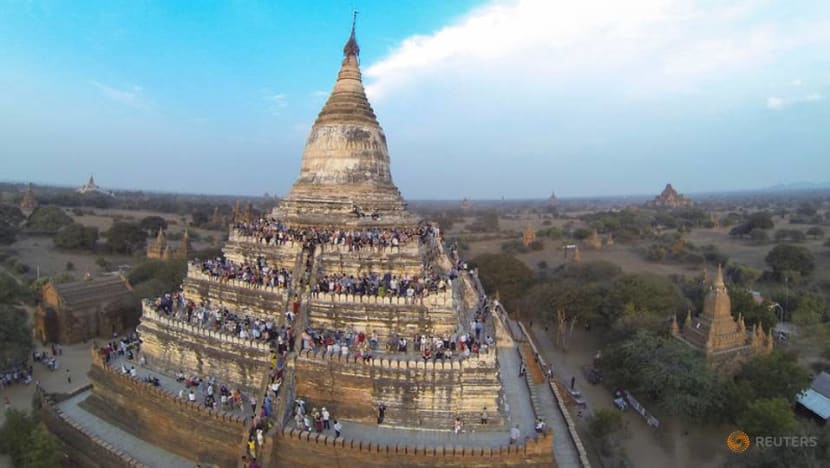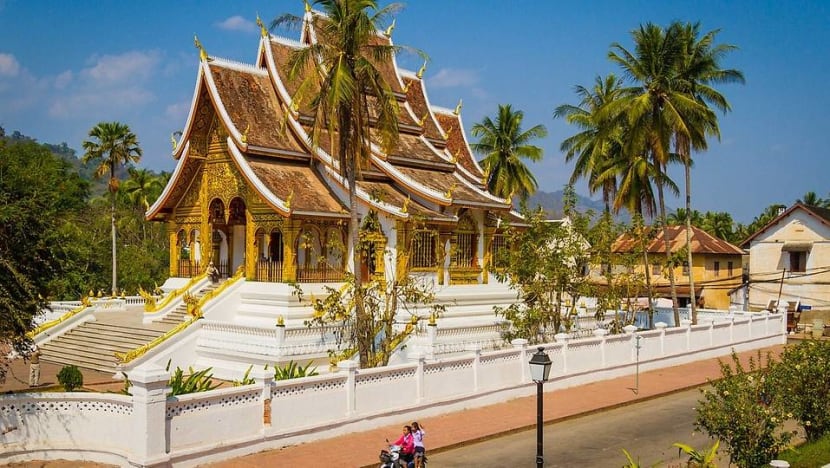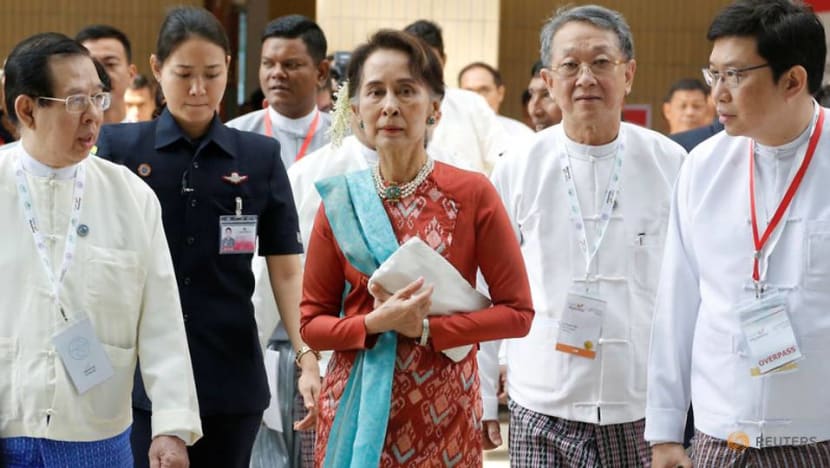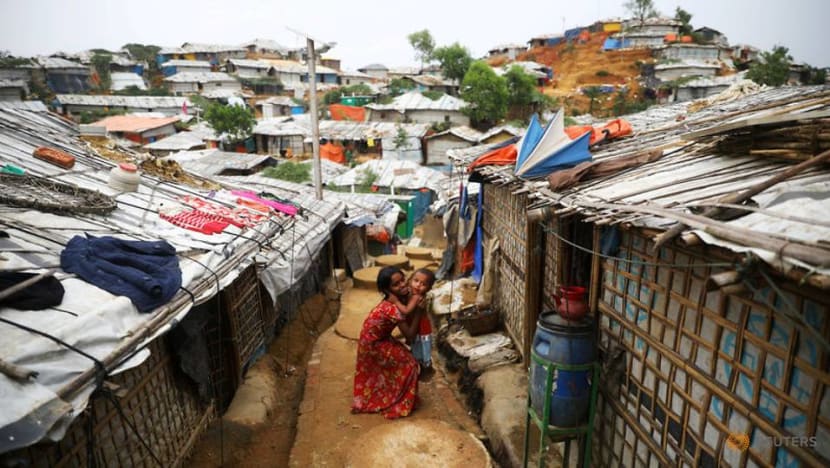commentary Commentary
Commentary: Bagan’s UNESCO World Heritage a win for Myanmar in more than one way
The UNESCO award may spur Myanmar to engage more with the outside world, says Myanmar affairs expert Nehginpao Kipgen.

People wait to see the sunset from the top of Shwesandaw Pagoda in the ancient city of Bagan on Feb 13, 2015. (File photo: REUTERS/Soe Zeya Tun
NEW DEHLI: On Saturday (Jul 6), Myanmar’s temple city of Bagan was awarded the United Nations Educational, Scientific and Cultural Organisation (UNESCO) World Heritage status during its 43rd session by the 21-member World Heritage Committee in Baku, Azerbaijan.
The International Council on Monuments and Sites recommended the listing after Myanmar had taken steps to meet stringent criteria established to protect Bagan.
The country had adopted a new heritage law in February, which places more restrictions on the redevelopment of areas in which historical sites are located, and enacted specific plans to reduce the impact of hotels and tourism developments around Bagan.
A NATIONAL WIN
The designation is a huge win for Myanmar. Authorities had put in a bid for Bagan in 1995 but were rejected, largely because they had not taken onboard authoritative advice on restoration efforts.
Instead, they approved renovations that critics have said compromised the architectural integrity of the site and incorporated inappropriate commercial development.
Indeed, the win suggests that Myanmar authorities have listened and taken onboard views from experts since.
Advisor to UNESCO Kai Weise had highlighted this year that if the Myanmar government wanted the ancient city to feature on the UNESCO list, it must meet strict conservation targets, including the implementation of a comprehensive management plan, and the removal of hotels from archaeological sites.
The victory also boosts national pride, reaffirms Myanmar’s position as a country of deep history, and has the potential to bolster its tourism industry, now that it has more than one monumental site UNESCO deems worth visiting.
BREWING CONCERNS ABOUT THE UNESCO AWARD
But it has not been a bed of roses for Myanmar since Bagan’s win was announced, as two different opinions have emerged.
While the people of Myanmar celebrate the recognition, some international observers question its appropriateness and timing, especially since Myanmar has been stuck in a stalemate with the UN over the Rohingya refugee crisis and other human rights abuses.
Indeed, for many keen observers, the Rohingya crisis seems to overshadow and colour any news regarding Myanmar, which is unfortunate for a country that should be allowed to commemorate achievements like this win.
READ: Old wounds, fresh denial in Myanmar over the Rohingya, a commentary
BENEFITS MYANMAR IMMENSELY
Welcoming the UNESCO award, Myanmar diplomat Kyaw Zeya, who was speaking on behalf of the Myanmar delegation at the Baku meeting, said:
Today we are celebrating the joyous moment of the successful inscription of Bagan in the World Heritage List. Afterwards we will continue our efforts on conservation and management of Bagan so that this treasured heritage will remain for another thousand years.
Indeed, three are three key reasons why Myanmar’s award is worth supporting.
First, it could raise global awareness of Bagan’s exceptional features and historical value, which can garner greater international support from private and charity organisations to preserve this heritage site, and stimulate local conservation efforts.
When floods hit Phong Nha-Ke Bang National Park in Vietnam, which was inscribed as a World Heritage site in 2003, the Italian government funded assistance to repair wildlife rescue facilities.
Second, Myanmar also stands to receive financial assistance and can better tap on international expert advice from the World Heritage Committee to support preservation efforts.
This would come in handy if Bagan meets with challenges to its integrity. Earthquakes have damaged these ancient structures, most recently in 2016 when about 389 pagodas were damaged by a 6.8-magnitude quake. The government had to carry out costly restoration works over four years.

Third, Myanmar stands to gain greater revenue from tourism given Bagan’s heightened profile, with multiplier effects for jobs, employment and its economy. Lao’s Luang Prabang has seen huge surges in tourism numbers since it made it to the list in 1995.
Overall, the closer cooperation between Myanmar and the UN could also engender greater engagement and support for the country on other issues beyond heritage and conservation. Such cooperation could give Myanmar greater assurance about the utility of international engagement and being outward-looking.
READ: UNESCO listing may lift hawker culture but saving it is a different challenge, a commentary
FOCUS ON ENGAGEMENT
There's no denying that this award is significant when it comes at a time when Myanmar’s political leadership are facing international criticism and condemnation over its treatment of the Rohingya and other ethnic minorities of the country.
Myanmar has been accused of perpetrating systematic violence and institutionalised discrimination against the Rohingya.

The international independent fact-finding mission, established by the UN Human Rights Council, in its report released last August stated that war crimes and crimes against humanity have been committed by Myanmar security forces with “genocidal intent” and called for the prosecution of Myanmar’s armed forces senior officers.
READ: Did the Rohingya crisis snuff out foreign direct investments in Myanmar? A commentary
The criticism levelled over UNESCO’s award at a time when many observers have said the country must do more to find an enduring solution to the Rohingya crisis is understandable. For these critics, the award seems tone-deaf and represents a willful ignorance of Myanmar policies regarding minorities.
But what good will denying Myanmar the UNESCO win do? Is it not better to step up international engagement with the country than let the Rohingya crisis sour how countries and international organisations approach Myanmar?
CONFIDENCE BUILDING
That might have been the thinking as UN agencies stay engaged with Myanmar in various other forums on several issues, including economic development and social assistance.
Unless there is a drastic change on the ground that might trigger international outrage, it is unlikely that the UN will take any stringent punitive action on the country, such as the closure of UN offices.
We are not likely to see such a turn of events, given the lack of unanimity among UN Security Council members on how to tackle the Rohingya crisis decisively.
READ: Myanmar on the cusp of opening up to mediation on Rakhine crisis, a commentary
Moreover, it is also important to note that it has been almost a quarter of century since Bagan was first nominated for the award. Myanmar deserves the award after it has taken advised steps to improve its chances of winning.

All in all, the UNESCO award is good for both Myanmar and the UN. It recognises the importance of the site and its more than 3,500 stupas, temples, monasteries and other structures which were built between the 11th and 13th centuries.
It can also be a confidence-building measure for both sides amid the ugly confrontation over human rights violations and the Rohingya crisis.
It may also spur Myanmar to engage more with the outside world and place greater emphasis on its role as a responsible member of the international community that has a stake in ensuring its reputation is clean and above board.
Dr Nehginpao Kipgen is an Associate Professor, Assistant Dean (International Collaboration) and Executive Director of the Center for Southeast Asian Studies, Jindal School of International Affairs, O P Jindal Global University. He is the author of three books on Myanmar, including Democratisation of Myanmar.














